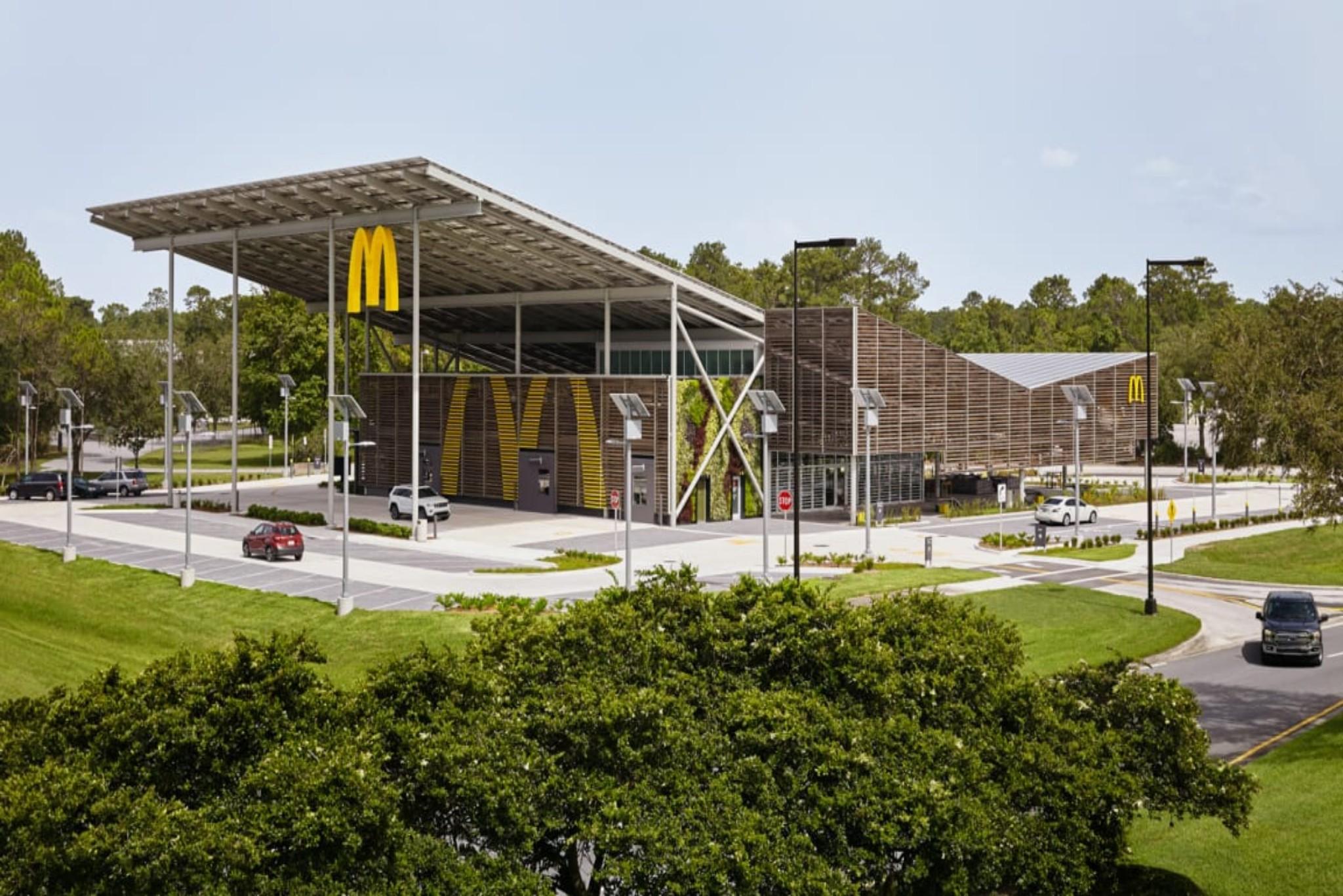Can solar panels McMagic away fast food’s dirty emissions?
McDonald’s is trying to cut its carbon footprint by more than a third over the next decades, writes Phoebe Cooke – but can the fast food giant really claim it is addressing the climate emergency while meat remains the focal point of the menu?

Decked out with solar panels and a living wall, McDonald’s first “net-zero” restaurant launched in Walt Disney World this week as a mouth-watering display of sustainability.
The swish model in Orlando, Florida, is light, airy and powered by 100 per cent renewable energy. In this brave new world, those dining in can even work off their Happy Meal by pedalling a solar-powered bike to light up the iconic golden arches.
This latest addition to the fast food giant’s 38,000 restaurant empire is touted as a “laboratory” to test solutions for reducing energy and water use. It’s all part of the chain’s plan to cut the carbon footprint of all its restaurants and offices by 36 per cent by 2030 from 2015 levels to meet Paris Treaty targets.
The numbers sound impressive, but it’s difficult to judge yet whether they are ambitious enough. The proposed reduction comes from a baseline of 9.4 million tonnes of carbon dioxide equivalent (Mt CO2e) from that supply chain alone. This represents 0.02 per cent of the UK’s entire net emissions of 351.5 Mt CO2e in 2019, or just under half the 20 Mt emitted through food waste in the UK each year.
A truly green fast food experience would indeed be a triumph for the climate, as well as an industry hit hard by Covid-19. But experts are concerned that sustainability efforts represented by this solar-powered restaurant could also serve to distract consumers from the climate impact of the products they are eating.
Professor Jill Atkins, chair in financial management at the University of Sheffield, suggests such initiatives are “good reputational and impression management techniques” rather than representing deep structural change.
She told The Independent: “McDonald’s faces a problem similar to the elephant in the room – if your whole business is focused on providing fast food which relies heavily on beef, poultry and fish, there is little room for manoeuvre.
“Beef production is being increasingly demonised for a whole variety of reasons. Methane gas from cattle is now acknowledged as a major factor contributing to climate change but intensive agriculture also involves excessive reliance on natural resources – water and land use involves clearing of natural habitats and deforestation especially in developing economies.”
These facts do not bode well for a fast food industry still dependent on meat for profit. Agricultural livestock contributes 14 per cent of anthropogenic greenhouse gas emissions, according to the UN’s Food and Agricultural Organisation (FAO). Cattle, mainly for beef, but also for milk and manure, represent 65 per cent of that number.
McDonald’s says it’s taking the sustainability of its beef products seriously and indeed launched a roundtable on the subject in 2011. In addition, the brand aims to cut the emissions intensity of the food and packaging in its supply chain by 31 per cent by 2030, also from a 2015 baseline.
Meanwhile, rival Burger King launched its Reduced Methane Emissions Beef Whopper this week, made from cows fed by lemongrass – which it says could reduce the harmful gas by 33 per cent. Both brands also have a growing vegetarian presence, with Burger King’s “meat-like” Impossible plant-based burger receiving rave reviews.
Even such headline-grabbing efforts come across as frills to the main meat of their business – the burger. Estimates from 2013 data suggest McDonald’s was then selling 2.36 billion burgers a year, each representing around 4kg of CO2e emissions. And the desire for meat shows no sign of stopping – the World Health Organisation projects that meat consumption will rise from 218 million tonnes in 1997-1999 to 376 million tonnes by 2030.
Fairr, an investors’ network focusing on the risk represented by livestock production, last year piled pressure on fast food’s largest chains to reduce their emissions. The $11tn (£8.7tn) investor coalition challenged fast food giants to set tough targets to reduce the greenhouse gas emissions and water usage of their meat and dairy suppliers.
But nearly 18 months on from the call, investors are not yet seeing the changes required to keep global heating below 2C by the end of this century.
Fairr’s executive director Maria Lettini told The Independent: “The livestock industry emits more greenhouse gases than the transport sector, but unlike other high-emitting sectors, it is not taking the scale of action required to align itself with the Paris Agreement and keep the world below 2C of warming.
“Even though we are seeing some ambitious commitments being made by high-street brands like McDonald’s, who are one of the few global fast food companies to set a science-based target for emissions reduction, investors are concerned that this is not yet translating into action among the farmers and processors that supply them.”
“Global fast food chains need to tackle their greenhouse gas emissions with the same urgency and focus as any other acute business risk.”
This week Fairr proposed a carbon tax for agricultural livestock. Lettini said that if implemented, major suppliers to McDonald’s, JBS and Tyson, would each risk losing up to $3bn (£2.3bn) in pre-tax earnings by 2050 if they fail to improve their climate management.
Join our commenting forum
Join thought-provoking conversations, follow other Independent readers and see their replies
Comments